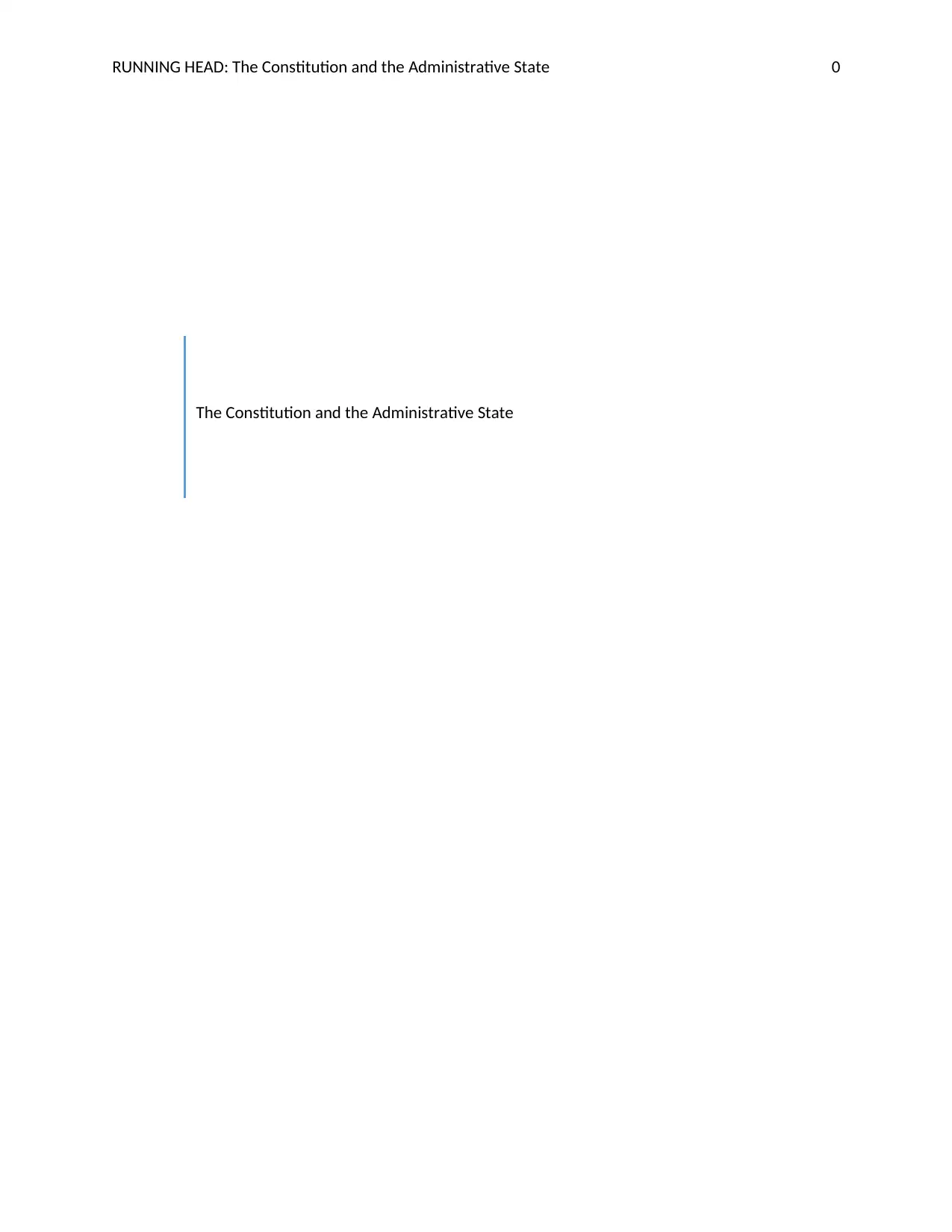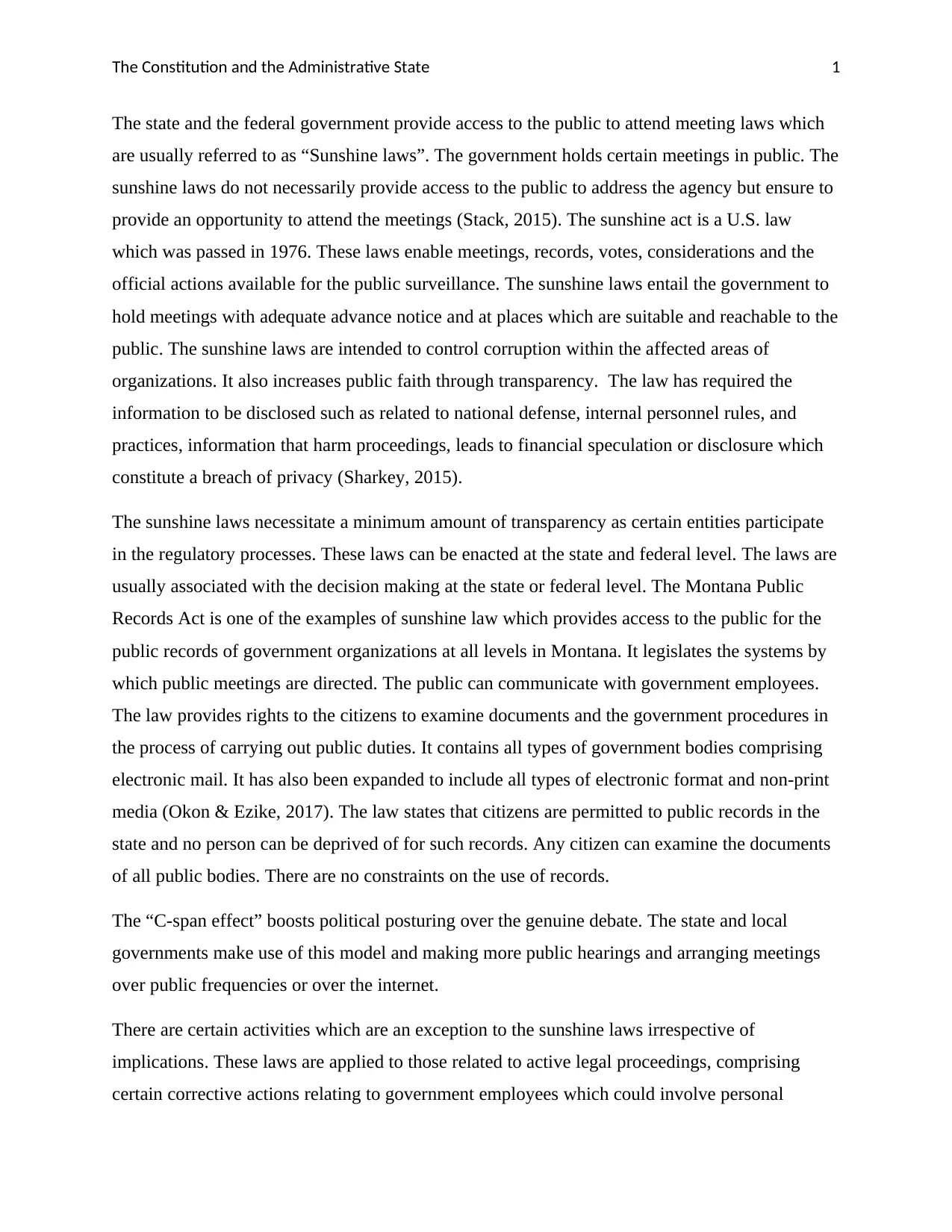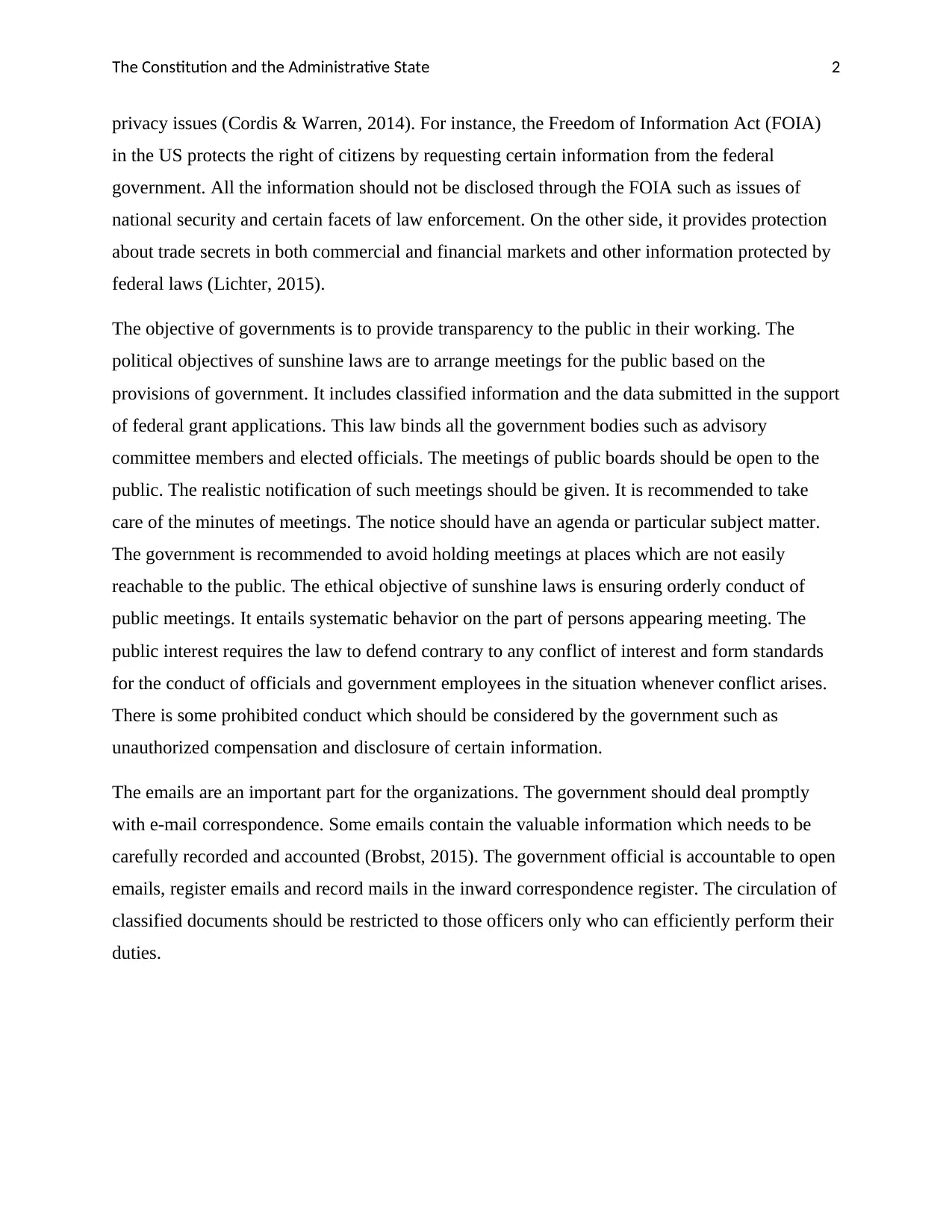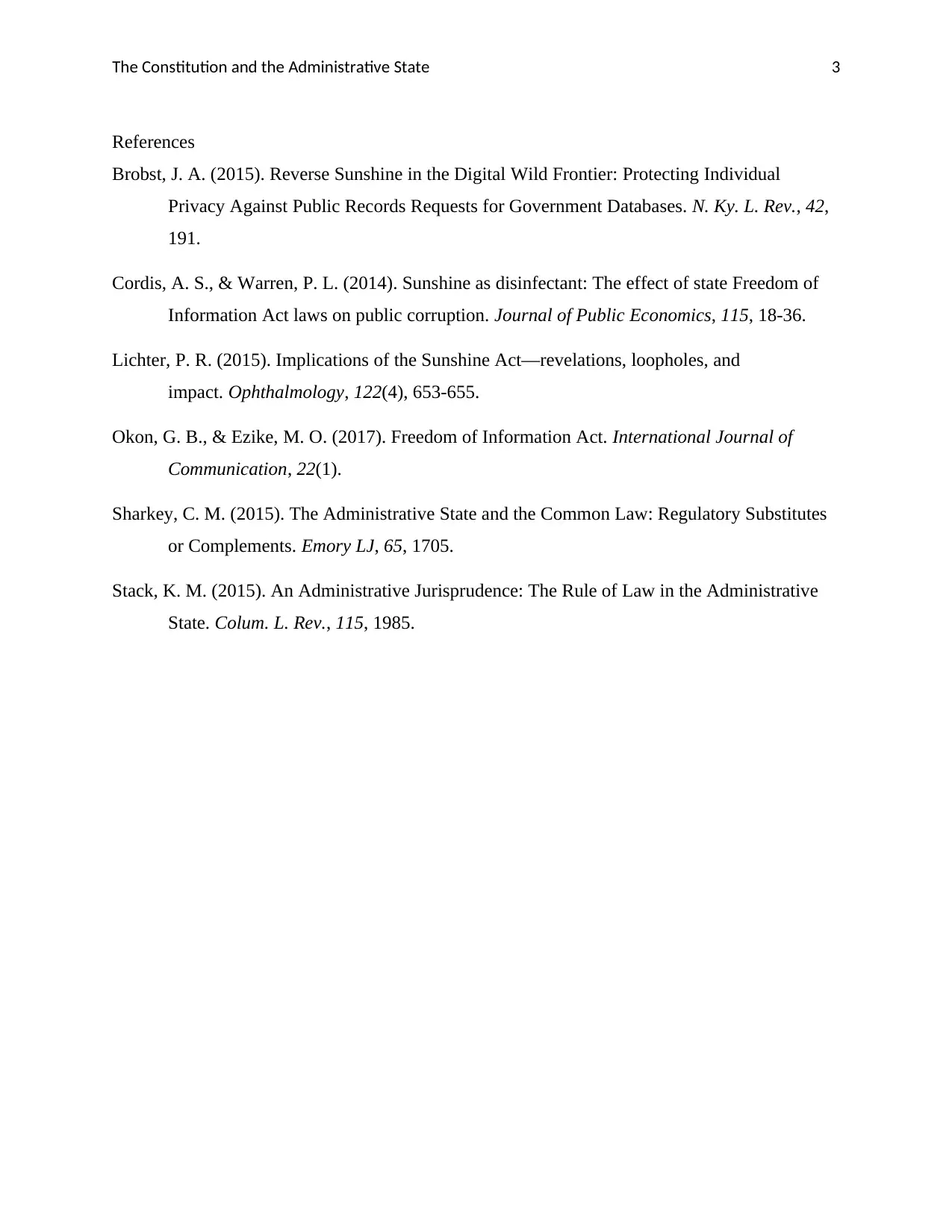Essay: The Constitution and the Administrative State in Detail
VerifiedAdded on 2023/06/09
|4
|1084
|224
Essay
AI Summary
This essay explores the relationship between the Constitution and the Administrative State, focusing on the role of transparency and public access. It discusses "Sunshine Laws" and their function in ensuring public oversight of government meetings, records, and actions, while also addressing exceptions related to privacy and national security. The essay highlights the Freedom of Information Act (FOIA) as a key mechanism for citizens to request information from the federal government, balancing public access with protections for sensitive information. It further examines the ethical and political objectives of these laws, emphasizing the importance of orderly conduct in public meetings, conflict of interest management, and proper handling of government communications, including emails and classified documents. The essay references relevant legal frameworks and provides examples of how these laws operate at both state and federal levels to promote accountability and public trust.

RUNNING HEAD: The Constitution and the Administrative State 0
The Constitution and the Administrative State
The Constitution and the Administrative State
Paraphrase This Document
Need a fresh take? Get an instant paraphrase of this document with our AI Paraphraser

The Constitution and the Administrative State 1
The state and the federal government provide access to the public to attend meeting laws which
are usually referred to as “Sunshine laws”. The government holds certain meetings in public. The
sunshine laws do not necessarily provide access to the public to address the agency but ensure to
provide an opportunity to attend the meetings (Stack, 2015). The sunshine act is a U.S. law
which was passed in 1976. These laws enable meetings, records, votes, considerations and the
official actions available for the public surveillance. The sunshine laws entail the government to
hold meetings with adequate advance notice and at places which are suitable and reachable to the
public. The sunshine laws are intended to control corruption within the affected areas of
organizations. It also increases public faith through transparency. The law has required the
information to be disclosed such as related to national defense, internal personnel rules, and
practices, information that harm proceedings, leads to financial speculation or disclosure which
constitute a breach of privacy (Sharkey, 2015).
The sunshine laws necessitate a minimum amount of transparency as certain entities participate
in the regulatory processes. These laws can be enacted at the state and federal level. The laws are
usually associated with the decision making at the state or federal level. The Montana Public
Records Act is one of the examples of sunshine law which provides access to the public for the
public records of government organizations at all levels in Montana. It legislates the systems by
which public meetings are directed. The public can communicate with government employees.
The law provides rights to the citizens to examine documents and the government procedures in
the process of carrying out public duties. It contains all types of government bodies comprising
electronic mail. It has also been expanded to include all types of electronic format and non-print
media (Okon & Ezike, 2017). The law states that citizens are permitted to public records in the
state and no person can be deprived of for such records. Any citizen can examine the documents
of all public bodies. There are no constraints on the use of records.
The “C-span effect” boosts political posturing over the genuine debate. The state and local
governments make use of this model and making more public hearings and arranging meetings
over public frequencies or over the internet.
There are certain activities which are an exception to the sunshine laws irrespective of
implications. These laws are applied to those related to active legal proceedings, comprising
certain corrective actions relating to government employees which could involve personal
The state and the federal government provide access to the public to attend meeting laws which
are usually referred to as “Sunshine laws”. The government holds certain meetings in public. The
sunshine laws do not necessarily provide access to the public to address the agency but ensure to
provide an opportunity to attend the meetings (Stack, 2015). The sunshine act is a U.S. law
which was passed in 1976. These laws enable meetings, records, votes, considerations and the
official actions available for the public surveillance. The sunshine laws entail the government to
hold meetings with adequate advance notice and at places which are suitable and reachable to the
public. The sunshine laws are intended to control corruption within the affected areas of
organizations. It also increases public faith through transparency. The law has required the
information to be disclosed such as related to national defense, internal personnel rules, and
practices, information that harm proceedings, leads to financial speculation or disclosure which
constitute a breach of privacy (Sharkey, 2015).
The sunshine laws necessitate a minimum amount of transparency as certain entities participate
in the regulatory processes. These laws can be enacted at the state and federal level. The laws are
usually associated with the decision making at the state or federal level. The Montana Public
Records Act is one of the examples of sunshine law which provides access to the public for the
public records of government organizations at all levels in Montana. It legislates the systems by
which public meetings are directed. The public can communicate with government employees.
The law provides rights to the citizens to examine documents and the government procedures in
the process of carrying out public duties. It contains all types of government bodies comprising
electronic mail. It has also been expanded to include all types of electronic format and non-print
media (Okon & Ezike, 2017). The law states that citizens are permitted to public records in the
state and no person can be deprived of for such records. Any citizen can examine the documents
of all public bodies. There are no constraints on the use of records.
The “C-span effect” boosts political posturing over the genuine debate. The state and local
governments make use of this model and making more public hearings and arranging meetings
over public frequencies or over the internet.
There are certain activities which are an exception to the sunshine laws irrespective of
implications. These laws are applied to those related to active legal proceedings, comprising
certain corrective actions relating to government employees which could involve personal

The Constitution and the Administrative State 2
privacy issues (Cordis & Warren, 2014). For instance, the Freedom of Information Act (FOIA)
in the US protects the right of citizens by requesting certain information from the federal
government. All the information should not be disclosed through the FOIA such as issues of
national security and certain facets of law enforcement. On the other side, it provides protection
about trade secrets in both commercial and financial markets and other information protected by
federal laws (Lichter, 2015).
The objective of governments is to provide transparency to the public in their working. The
political objectives of sunshine laws are to arrange meetings for the public based on the
provisions of government. It includes classified information and the data submitted in the support
of federal grant applications. This law binds all the government bodies such as advisory
committee members and elected officials. The meetings of public boards should be open to the
public. The realistic notification of such meetings should be given. It is recommended to take
care of the minutes of meetings. The notice should have an agenda or particular subject matter.
The government is recommended to avoid holding meetings at places which are not easily
reachable to the public. The ethical objective of sunshine laws is ensuring orderly conduct of
public meetings. It entails systematic behavior on the part of persons appearing meeting. The
public interest requires the law to defend contrary to any conflict of interest and form standards
for the conduct of officials and government employees in the situation whenever conflict arises.
There is some prohibited conduct which should be considered by the government such as
unauthorized compensation and disclosure of certain information.
The emails are an important part for the organizations. The government should deal promptly
with e-mail correspondence. Some emails contain the valuable information which needs to be
carefully recorded and accounted (Brobst, 2015). The government official is accountable to open
emails, register emails and record mails in the inward correspondence register. The circulation of
classified documents should be restricted to those officers only who can efficiently perform their
duties.
privacy issues (Cordis & Warren, 2014). For instance, the Freedom of Information Act (FOIA)
in the US protects the right of citizens by requesting certain information from the federal
government. All the information should not be disclosed through the FOIA such as issues of
national security and certain facets of law enforcement. On the other side, it provides protection
about trade secrets in both commercial and financial markets and other information protected by
federal laws (Lichter, 2015).
The objective of governments is to provide transparency to the public in their working. The
political objectives of sunshine laws are to arrange meetings for the public based on the
provisions of government. It includes classified information and the data submitted in the support
of federal grant applications. This law binds all the government bodies such as advisory
committee members and elected officials. The meetings of public boards should be open to the
public. The realistic notification of such meetings should be given. It is recommended to take
care of the minutes of meetings. The notice should have an agenda or particular subject matter.
The government is recommended to avoid holding meetings at places which are not easily
reachable to the public. The ethical objective of sunshine laws is ensuring orderly conduct of
public meetings. It entails systematic behavior on the part of persons appearing meeting. The
public interest requires the law to defend contrary to any conflict of interest and form standards
for the conduct of officials and government employees in the situation whenever conflict arises.
There is some prohibited conduct which should be considered by the government such as
unauthorized compensation and disclosure of certain information.
The emails are an important part for the organizations. The government should deal promptly
with e-mail correspondence. Some emails contain the valuable information which needs to be
carefully recorded and accounted (Brobst, 2015). The government official is accountable to open
emails, register emails and record mails in the inward correspondence register. The circulation of
classified documents should be restricted to those officers only who can efficiently perform their
duties.
⊘ This is a preview!⊘
Do you want full access?
Subscribe today to unlock all pages.

Trusted by 1+ million students worldwide

The Constitution and the Administrative State 3
References
Brobst, J. A. (2015). Reverse Sunshine in the Digital Wild Frontier: Protecting Individual
Privacy Against Public Records Requests for Government Databases. N. Ky. L. Rev., 42,
191.
Cordis, A. S., & Warren, P. L. (2014). Sunshine as disinfectant: The effect of state Freedom of
Information Act laws on public corruption. Journal of Public Economics, 115, 18-36.
Lichter, P. R. (2015). Implications of the Sunshine Act—revelations, loopholes, and
impact. Ophthalmology, 122(4), 653-655.
Okon, G. B., & Ezike, M. O. (2017). Freedom of Information Act. International Journal of
Communication, 22(1).
Sharkey, C. M. (2015). The Administrative State and the Common Law: Regulatory Substitutes
or Complements. Emory LJ, 65, 1705.
Stack, K. M. (2015). An Administrative Jurisprudence: The Rule of Law in the Administrative
State. Colum. L. Rev., 115, 1985.
References
Brobst, J. A. (2015). Reverse Sunshine in the Digital Wild Frontier: Protecting Individual
Privacy Against Public Records Requests for Government Databases. N. Ky. L. Rev., 42,
191.
Cordis, A. S., & Warren, P. L. (2014). Sunshine as disinfectant: The effect of state Freedom of
Information Act laws on public corruption. Journal of Public Economics, 115, 18-36.
Lichter, P. R. (2015). Implications of the Sunshine Act—revelations, loopholes, and
impact. Ophthalmology, 122(4), 653-655.
Okon, G. B., & Ezike, M. O. (2017). Freedom of Information Act. International Journal of
Communication, 22(1).
Sharkey, C. M. (2015). The Administrative State and the Common Law: Regulatory Substitutes
or Complements. Emory LJ, 65, 1705.
Stack, K. M. (2015). An Administrative Jurisprudence: The Rule of Law in the Administrative
State. Colum. L. Rev., 115, 1985.
1 out of 4
Related Documents
Your All-in-One AI-Powered Toolkit for Academic Success.
+13062052269
info@desklib.com
Available 24*7 on WhatsApp / Email
![[object Object]](/_next/static/media/star-bottom.7253800d.svg)
Unlock your academic potential
Copyright © 2020–2026 A2Z Services. All Rights Reserved. Developed and managed by ZUCOL.





